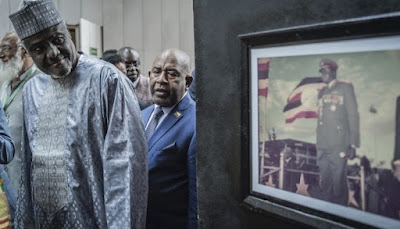Report at TheAfricaReport.com
By AFP (Agence France-Presse)
Dated Friday 26 May 2023; 09:24 - full copy:
NEW COLD WAR?
Africa must not become ‘geostrategic battleground’ warns AU
Moussa Faki Mahamat (1st L), Chairperson of the African Union Commission (AUC) looks at a photo exhibition during the 60th anniversary of the Organization of African Unity (OAU), now African Union (AU), at the African Union headquarters in Addis Ababa on May 25, 2023. (Photo by Amanuel Sileshi / AFP)
Africa must not become a “geostrategic battleground” for global powers, as it grapples with several threats to its own peace and security, African Union leaders warn.
The continent of 1.3 billion people has found itself at the centre of a tussle for influence among the major powers, which has redoubled since Russia’s invasion of Ukraine 15 months ago.
And just as the AU marked the anniversary of the creation of its forerunner, the Organisation of African Unity, on this day in 1963, Ukraine itself announced it wanted to boost ties with Africa.
“In this international context of confrontation of divergent political interests, the will of each side threatens to transform Africa into a geostrategic battleground, thereby creating a new Cold War,” AU Commission chair Moussa Faki Mahamat said.
“In this zero-sum game, where the gains of others would translate into losses for Africa, we must resist all forms of instrumentalisation of our member states,” he added in an address at AU headquarters in the Ethiopian capital Addis Ababa.
Moscow is seeking deeper political, economic and military ties in Africa as well as Asia as Russia becomes increasingly isolated on the international stage over the conflict in Ukraine.
‘Capacity for resilience’
Ukraine’s Foreign Minister Dmytro Kuleba, who is currently on a tour of Africa, on Wednesday urged certain African nations to end their “neutrality” over the war.
In February, 22 AU member states abstained or did not vote on a UN General Assembly resolution that called for Russia withdraw from Ukraine.
Two of them – Eritrea and Mali – voted against the resolution.
And in a statement to mark the pan-African body’s anniversary, Kuleba also announced a Ukrainian diplomatic push on the continent.
“We want to develop a new quality of partnership based on three mutual principles: mutual respect, mutual interests, and mutual benefits,” he said, announcing plans to establish new embassies in Africa and hold a Ukraine-Africa summit.
In this zero-sum game, where the gains of others would translate into losses for Africa, we must resist all forms of instrumentalisation of our member states.
Moscow itself has scheduled a Russia-Africa summit in July, following a trip to several African countries at the start of the year by Foreign Minister Sergei Lavrov.
China and the US have also despatched their foreign ministers to the continent in rival diplomatic offensives this year.
Beijing has funded major infrastructure development in Africa but denies Western charges it is practising “debt-trap diplomacy”, while Russia is a key arms exporter and is making forays through mining projects, analysts say.
‘Conflicts and terrorism persist’
Faki meanwhile also hailed the successes of the 54-nation AU which succeeded the OAU in 2002: “Independence and victory against apartheid, that of significant economic and scientific progress, sports, arts, the growing international role of Africa and so on.”
However, he also acknowledged “negative factors such as democratic decline through unconstitutional changes of government, with their litany of oppression and gagging of freedoms, insecurity, the spread of terrorism, violent extremism, the uncontrolled circulation of arms, the harmful effects of climate change”.
Despite the difficulties, Faki said, Africa remains “characterised by its greater capacity for resilience”, pointing for example to its response to the Covid-19 pandemic.
The current head of the African Union, Comoros President Azali Assoumani also denounced “the unconstitutional changes of power” which have multiplied in Africa in recent years.
“Inter and intra-African conflicts but also terrorism persists and consequently the peace, security, democracy and development of our continent are threatened in several of our countries,” he said.
Assoumani spoke of the conflict between rival generals in Sudan which erupted in mid-April and has persisted despite several truce agreements.
“We must convince our brothers in Sudan to favour dialogue so that the fratricidal war raging in this country ends,” he added.
View original: https://www.theafricareport.com/310874/africa-must-not-become-geostrategic-battleground-warns-au/
[Ends]

